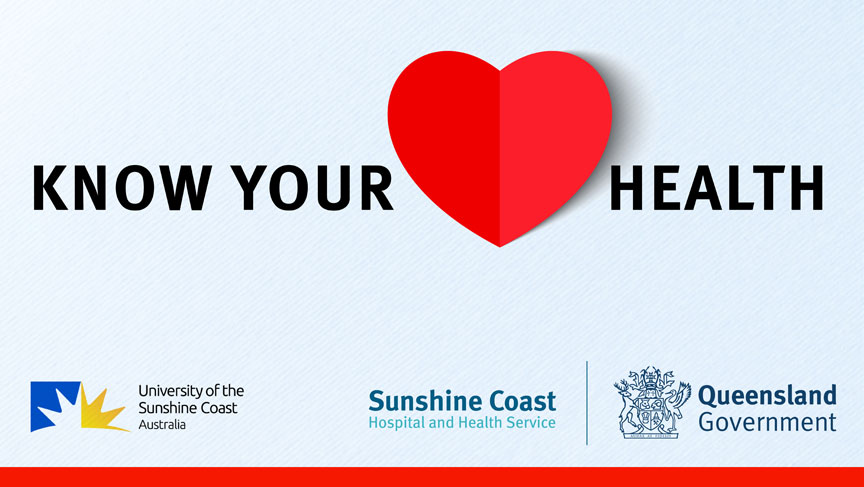
Free heart health checks will be offered at the launch of a cardiovascular rehabilitation and research program on World Heart Day (29 September 2022).
Clinical Nurse Consultant Michelle Aust said the program, jointly funded by Sunshine Coast Hospital and Health Service (SCHHS) and University of Sunshine Coast (UniSC), will deliver the latest developments in care for patients recovering from heart attacks and cardiovascular surgery.
The program will operate from a community-based clinic located within the O2 Performance gym in the Sports Hub at Birtinya.
“A patient’s cardiac rehab phase is typically about six weeks, and they often ask what happens next,” Ms Aust said.
“This model of care can help patients join a regular gym and hopefully start them on a journey to better care for themselves in the longer term.
“We used to think that patients would graduate from cardiac rehab and be fine – but that’s not necessarily the case.
“We aim to help patients improve their quality of life and reduce future hospital admissions; this model of care supports people to continue to exercise and maintain an active lifestyle after they have left our program.
“The clinic at the Sports Hub gives us space to expand our service to offer more places to patients and reduce wait times,” she said.
Associate Professor Chris Askew said the program supported research on expanding cardiovascular rehabilitation to target secondary prevention in high-risk patients.
“UniSC researchers and PhD students will work closely with clinicians to investigate real-world clinical challenges with findings translated back into the program.
“Findings are also published, so the research has reach and potential impact all around the world,” he said.
“The research will be tied to the rehabilitation service and will include researchers and clinicians from medicine, nursing, exercise physiology and other areas of allied health like dietetics and psychology, with a focus on optimising and advancing the care of people with cardiovascular disease.
“Through research focused on patients who have recently had a heart attack or heart surgery, we can discover how rehabilitation can be tailored to improve quality of life, prevent disease progression, improve life expectancy, and reduce the need for hospital care.
“An example might be a hybrid model where the patient comes on site for some of the time, but they do some of the rehab at their own home or closer to their own home; and we would test that through research before rolling it out as part of the standard service.
“It’s not automatic that patients coming to the program are involved in the research, but they are given the opportunity to participate if they wish.”
He said the program included work-integrated learning opportunities for UniSC exercise physiology, nursing and allied health students.
“Students studying health degrees will be able to undertake student placements at the Sports Hub as part of the service delivery and research."
Ms Aust said patients could be referred to the community-based cardiovascular rehabilitation clinic through their hospital clinician or GP; and would consent separately if they chose to participate in the research.
Patient story
Sunshine Coast local, Adam is part way through his cardiovascular rehabilitation program after having surgery to remove a massive 90–95 per cent blockage in his left main coronary artery.
Adam, aged 49 years, was very active, cycling and running several times per week.
“I started getting a burning sensation in my chest when I was exercising; I thought it had to be indigestion,” he said.
“But then it came on me when I was mowing the lawn and I thought this can’t be indigestion.”
Adam saw his GP the next day and was admitted to hospital for tests.
“I was joking with the cardiologist, saying ‘hurry up and get this done so I can see a gastrologist about my indigestion’,” he said.
“Then he showed me the blockage and he said he’d have to put a stent in then and there in the angiogram lab.
“I was very lucky; I was in disbelief because I go to the doctor every year for a check-up, and I thought everything was good.”
Adam started cardiovascular rehabilitation at Sunshine Coast University Hospital six weeks later.
“It has allowed me to test myself and get my fitness up while being monitored by the team there,” he said.
“I didn’t frequent a gym at all before my surgery, but I’m definitely going to continue doing cardio and strength exercises in a gym when the program is up.
“I think having the rehab clinic in a gym away from the hospital will encourage people who weren’t very active to keep up their exercise and stay active after their rehab is finished.
“There is some negativity around going to a hospital and I think people will be less resistant to going to a gym.
“At a gym you can tap into other services like personal trainers, dietitians and physiotherapists.
“And you don’t have to pay for parking; that’s always a plus.”